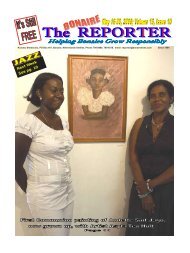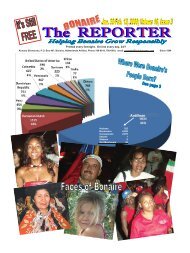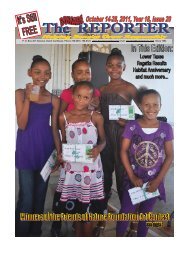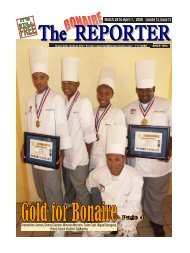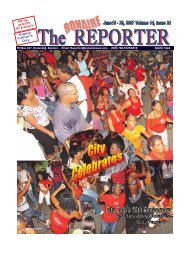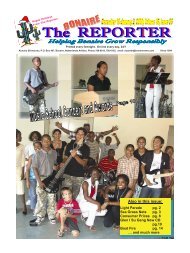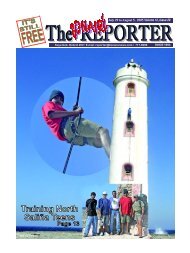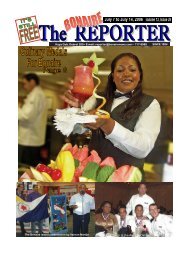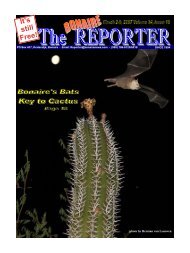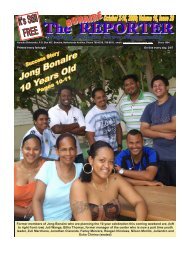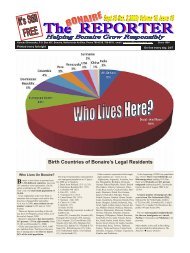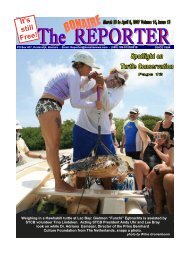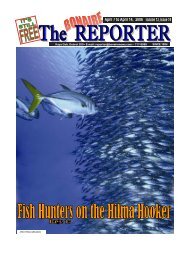Johannetta Gordijn photo - Bonaire Reporter
Johannetta Gordijn photo - Bonaire Reporter
Johannetta Gordijn photo - Bonaire Reporter
You also want an ePaper? Increase the reach of your titles
YUMPU automatically turns print PDFs into web optimized ePapers that Google loves.
Dust Happens (Continued from page 8)<br />
Very little legislation and policy regarding emission<br />
of dust and especially particulate matter is<br />
in place. In the Dutch Antilles only Curaçao has<br />
some legislation concerning air quality (emission<br />
norms); daily averages of total suspended particles<br />
(TSP) levels may not exceed 150 μg/m3.<br />
Concerning dust emission there is no legislation<br />
at all for the Dutch Antilles; this means that<br />
companies that generate dust (mineral or other)<br />
are not limited. For emission of dust from heavy<br />
industry and power plants (mainly SO2 and NOx)<br />
legislation can be implemented that already exists<br />
in the Netherlands. This, however, is not<br />
applicable for the stone crushing industry as the<br />
type of emission and type of dust are very different.<br />
The investigation report by the KibraHacha<br />
Foundation showed that various places on <strong>Bonaire</strong><br />
have more dust in the air than is allowed by<br />
the Antillean standards: primarily along dirt<br />
roads with heavy traffic and up to 5 times more<br />
in the near stone crushers to 11 times more. As<br />
well as during the hurricane season (May-<br />
October) due to Saharan dust driven towards the<br />
Caribbean these are disturbing findings for public<br />
health.<br />
Recommendations-<br />
Opportunities need to be created to get people<br />
back on the kunukus, otherwise the terrain will<br />
keep degrading. Examples are new irrigated agriculture,<br />
agro tourism and environmental schemes<br />
where land owners are paid to take care of their<br />
land and an approach aimed at restoring biodiversity.<br />
Dust emission as a result of traffic can be<br />
greatly reduced by paving more streets in residential<br />
areas. Another measure could be implementing<br />
legislation concerning industrial traf-<br />
From <strong>Bonaire</strong> Nautico Marina<br />
THE ONLY<br />
WALKON / WALKOFF<br />
Catamaran Kantika di Amor<br />
Up to 27 people and supported by<br />
a brand new larger sister<br />
Catamaran Kantika Too<br />
Up to 50 people<br />
<strong>Bonaire</strong> <strong>Reporter</strong>- Feb. 5-19, 2010<br />
TRIPS<br />
Every<br />
Day<br />
Daily trips via resorts 10 am, 12 , 2 pm Except<br />
Sundays at 10 am only<br />
Also available for group trips<br />
(max 1.90 meter draft),<br />
Water and 115/220 v.<br />
Dinghy tie up at north-inside dock at<br />
US$10 weekly up from Monday till<br />
Monday.<br />
BONAIRE NAUTICO MARINA<br />
At It Rains Fishes Restaurant<br />
Call Henk at 560-7254 / Bob 786-5399<br />
www.bonairenauticomarina /VHF 68<br />
info@bonairenauticomarina.com<br />
fic (trucks with building materials etc.). For instance<br />
set up special routes avoiding certain residential<br />
areas, better speed control, and covering<br />
up of dust sensitive materials like plaster sand<br />
and ground diabase.<br />
Other recommendations include:<br />
• Move stone crushers to isolated areas.<br />
• Cover dust producing material on construction<br />
sites and during their transportation.<br />
• Develop sustainable agriculture.<br />
The project was made possible by the generous<br />
assistance of the following sponsors: Hertz Car<br />
Rental, Total Car Rental, Budget Rent a Car, IFC<br />
Consolidators, Rocargo, Curoil, Goalkeeper Hoeve<br />
BV, Meyer Moving, Achie Tours.<br />
More information can be obtained at Foundation<br />
KibraHacha, Jan Jaap van Almenkerk and<br />
Maarten Schuit, phone 700-9630,<br />
http://www.stichting-kibrahacha.blogspot.com<br />
This article addresses in particular the causes<br />
of dust pollution and the impact of dust on health<br />
and environment. Other detailed information<br />
about the study can be obtained by downloading<br />
from this study site: http://www.stichtingkibrahacha.blogspot.com.�<br />
*The type of dust examined in this report is mineral<br />
dust, or soil dust. This dust consists of the smallest<br />
particles that can be found within the soil. The soils<br />
on <strong>Bonaire</strong> are mostly a mixture of sand and silt,<br />
with a low fraction of clay. As a rule<br />
of thumb, the smaller the particles,<br />
the more dangerous they are.<br />
When these particles enter the lungs<br />
they can cause all kinds of respiratory<br />
complaints, ranging from asthma up to<br />
lung cancer. �<br />
Report provided by Jan Jaap van<br />
Almenkerk<br />
Custom<br />
Framing<br />
by experienced<br />
craftsmen/<br />
artists<br />
Gladys Peereboom<br />
Mark Roswell<br />
Wide selection of<br />
frames for every<br />
canvas or <strong>photo</strong>graph<br />
Kaya Rotterdam 10<br />
Hato<br />
Phones: 717-8050<br />
09 567-1143<br />
Email-<br />
gladysfrits<br />
@telbonet.an<br />
HOW HEALTHY IS YOUR PROSTATE?<br />
f you have been following my I articles, you would have noticed<br />
that I have been talking about<br />
the adrenal glands for a while now.<br />
If you have been unlucky to have<br />
had prostate problems, I can almost<br />
guarantee you (there is the<br />
occasional exception!) that no-one<br />
has ever mentioned your adrenal<br />
gland. Most men, even though<br />
‘cured’ still live in fear, and rightly<br />
so. So what has your adrenal<br />
glands got to do with your prostate?<br />
What follows is a simplified<br />
version of a complex organ in your<br />
reproductive system. The prostate<br />
is clam-shaped and consists of<br />
three lobes which surround the<br />
neck of the bladder and urethra. It<br />
is partly muscular tissue and partly<br />
glandular tissue. The prostate<br />
gland secretes a thin, semi-clear,<br />
alkaline fluid, which makes up<br />
30% of the seminal fluid. This<br />
fluid is used primarily for lubrication,<br />
but also stimulates active<br />
sperm movement. Prostatitis<br />
(inflammation of the prostate<br />
gland) occurs from acidosis. The<br />
most common contributing factor,<br />
however, is hypo-active (underactive)<br />
adrenal glands (due to over<br />
-acidity). This creates low steroid<br />
production needed to counterbalance<br />
aggressive (acidic) male hormones<br />
which lead to prostate overstimulation<br />
and inflammation.<br />
Whether you have had or are<br />
currently suffering from prostatitis,<br />
enlargement or cancer of the prostate,<br />
your past and current diet is<br />
mostly to blame. Since most men<br />
eat a predominantly acid-forming<br />
diet - meat, refined sugars, dairy<br />
products and alcohol - and some<br />
lead a stressful life (yes, sometimes<br />
the wife is to blame), overacidic<br />
conditions of the body (both<br />
systemic and cellular) begin to<br />
take place. With time, over-acidity<br />
causes hormonal imbalances that<br />
are known to clog the tiny blood<br />
vessels of the prostate and could<br />
cause cancer.<br />
When your doctor gives you a<br />
diagnoses of prostate cancer, he or<br />
she will also tell you that treatment<br />
should begin immediately, or else<br />
……………….. ! Often surgery is<br />
suggested with, in more cases than<br />
not, dire consequences! Radiation<br />
is another popular therapy, which<br />
could possibly work only if the<br />
cancer has not spread. Chemotherapy<br />
uses powerful drugs to kill<br />
cancer cells, but the drug don’t<br />
specifically target cancer cells.<br />
Instead they look for any rapidly<br />
growing cell. Cancer cells grow<br />
rapidly, but so do hair cells, cells<br />
lining the stomach, cells of the<br />
immune system, and cells in the<br />
bones. They too are killed by chemotherapy,<br />
causing a host of terrible<br />
side effects.<br />
Traditional surgery, radiation<br />
and chemotherapy in my opinion,<br />
all miss the boat. None of them<br />
cleanse the body of toxins and<br />
blockages, or strengthen the<br />
body to heal itself.<br />
A good detoxification program,<br />
followed by herbal supplements<br />
and an improved nutritional diet is<br />
your best option in restoring your<br />
health, not just for the immediate<br />
future, but long-term. Besides,<br />
you can always fall back on your<br />
medical treatment of choice, if<br />
necessary.<br />
Firstly, listen to your body. Do<br />
not ignore or put off all those small<br />
warning signals that you are being<br />
given. Secondly, being diagnosed<br />
with a prostate problem is not a<br />
death sentence, although far too<br />
often it is because of the treatment<br />
chosen! Thirdly, explore all your<br />
options!<br />
Next issue – The Yeast Epidemic.<br />
�<br />
Stephanie Bennett<br />
Author<br />
Stephanie Bennett<br />
was born in<br />
Cape Town,<br />
South Africa,<br />
where she studied herbs, minerals<br />
and nutrition. Before moving to<br />
<strong>Bonaire</strong> she continued her studies<br />
in UK, and now researches health<br />
issues that particularly affect people<br />
on <strong>Bonaire</strong> and other Caribbean<br />
Islands.<br />
Page 9



